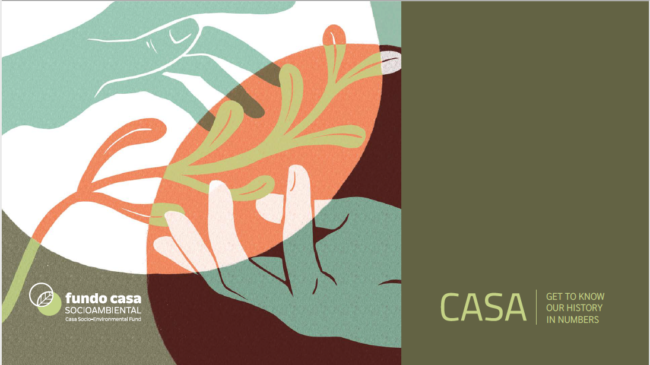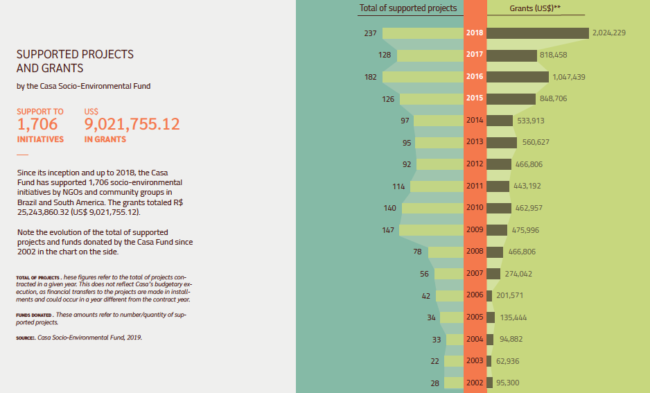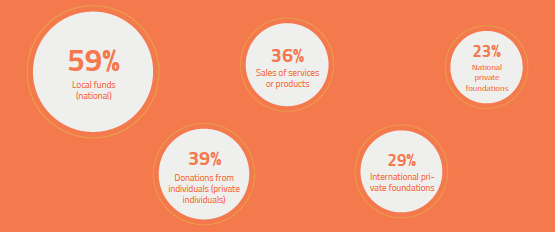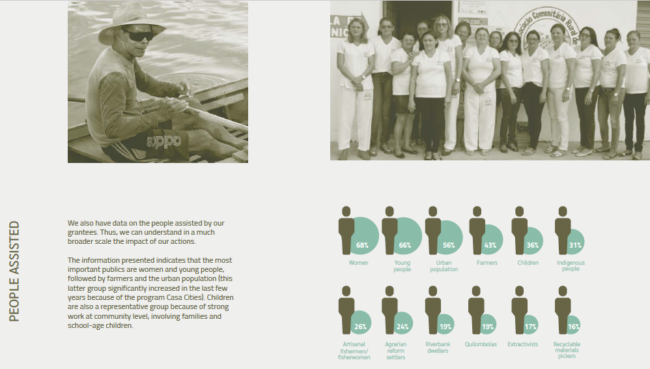 09.11.2020
09.11.2020
15 years of grantmaking and community philanthropy
By Cristina Orpheo – Executive Director of the Casa Socio-Environmental Fund
We live on an interconnected planet. Whatever happens in our communities – in the city, rural area or forest – could be reflected in all territories and affect the lives of all beings living in them.
Thus, it is everyone’s right to actively participate in decision making involving their territories. It is also everyone’s right to seek the means to live well, in a manner respectful of the traditional way of life, as well as the surrounding ecosystems, always exercising the defense of their rights. In most cases, this is not a simple matter, but it is the pathway to build a just and peaceful society. This is democracy! A strong, attentive, and participatory civil society is a sign of a consolidated democracy. However, we live in Brazil, a young democracy and thus vulnerable in several aspects.

Excerpt from the publication Our History in Numbers – Casa Socio-Environmental Fund
The Casa Socio-Environmental Fund was founded in 2005 with the clear objective of strengthening democratic processes and promoting socio-environmental justice by supporting projects that reinforced the capacities of community-based groups. We cannot talk about social justice without addressing the democratization of the access to philanthropic funding. Developing ways so funds could be accessed by collectives, movements, networks or small associations, in accordance with existing legislation and seeking good practice standards in financial management, is the challenge and commitment assumed by Casa Fund. We want to make it possible for philanthropic grants to reach distant, invisible or at least actors inaccessible to conventional philanthropy.
With 1,706 supported initiatives and R$ 25,243,860.32 (US$ 9,021,755.12) in grantmaking, the Casa Fund hired the specialist Graciela Hopstein in 2019 to carry out a broad evaluation of our programmatic area of project support and thus better understand the outcomes of our long history.
This evaluation resulted in a detailed X-ray of the following aspects:
● Profile of supported groups
● Location of these groups
● Main activities funded in this period
● Impacts generated by these initiatives

Excerpt from the publication Our History in Numbers – Casa Socio-Environmental Fund
To achieve these results, we carried out a broad process of analyses of internal reports, as well as interviews with a great diversity of actors, from founders to funders, partners, supported groups, staff, and coordinators of different programs.
The result was extraordinary! Among many findings, this study showed that the most supported themes were the following:
● Capacity building – indicated by 88% of the groups
● Debates and networking with different actors – indicated by 76% of the groups
● Networking with public policies – indicated by 63% of the groups
● Participation in decision making processes – indicated by 56% of the groups
● Protection/conservation of territories – indicated by 54% of the groups

Excerpt from the publication Our History in Numbers – Casa Socio-Environmental Fund
The study revealed a strong and intrinsic connection between socio-environmental themes and human rights. Seventy per cent of supported groups work with human rights, 65% with gender issues, 60% with poverty reduction and biodiversity conservation, and 55% with a direct connection between human rights and environmental conservation.
The evaluation also showed that the Casa Fund grants are not the only source of financing for the groups and organizations we support. They also mobilize funds from their own communities and offer their time to do volunteer work, among other forms of support. Some of them are also able to access sponsorships and other external investments. Even so, in 39% of the cases the Casa Fund was the first external grantmaker. We know we have an essential role in making these initiatives visible so they might attract new funds. For those a little more experienced, we realized that their main source of funding is third-party donations, especially local funds, and to a lesser extent, national and international private foundations.

Excerpt from the publication Our History in Numbers – Casa Socio-Environmental Fund
The evaluation also recognized some “assets” built by the Casa Fund during these 15 years of work:
● Strong networking – The work developed by the Casa Fund is connected to the networks in the territories and it is based on trusting relations established with local groups and socio-environmental movements. This provides a horizontal model for our relations and the grantmaking processes.
● Assertive methodology – The entire process of selecting, approving, and monitoring projects relies on a large collaborative network in the territories, which maximizes exponentially our outreach potential, thus including the most distant groups.
● Focus on grants – Over 70% of the Casa Fund grantmaking were direct donations to community groups in some of the years evaluated. This highlights our work based on a methodology that substantially reduces operational costs, prioritizing activities related to our mission as donor.
● Strengthening capacities – Capacity building actions with groups are considered strategic and complementary to the support.
● Protagonism in the communities – The work is based on the recognition of communities as political subjects, playing a leading role in local transformational processes.
● Listening and innovating – Supporting pioneer themes and having a special feeling to recognize community demands and needs are other great assets of the Casa Fund mentioned by several actors.
Casa Fund is part of a category of community funds and foundations, also known as grantmakers, supporting different initiatives in the areas of social justice, human rights, and citizens’ rights. Because they are not constrained by conventional practices, these community funds and foundations can be sources of innovation and bold initiatives. As they fund pioneer themes with a broad vision of the future, in addition to enabling discussion and dialogue, they also make it possible to implement important innovations in the solution of social problems and inspire public policies that are highly beneficial to groups and communities.

Excerpt from the publication Our History in Numbers – Casa Socio-Environmental Fund
With this diagnosis and its findings, we hope our experience will contribute to the philanthropic camp as a whole, highlighting the work of hundreds of community groups building a better world. Above all, we wish this story told in numbers that demonstrate undeniable positive impacts will inspire other philanthropic actors to adopt similar approaches. To support actions led by the communities most vulnerable to social injustices and environmental destruction will reinforce their voices. To invest in the true protagonists is the shortest route to implement the transformations we wish for this world.
Have a good read!
